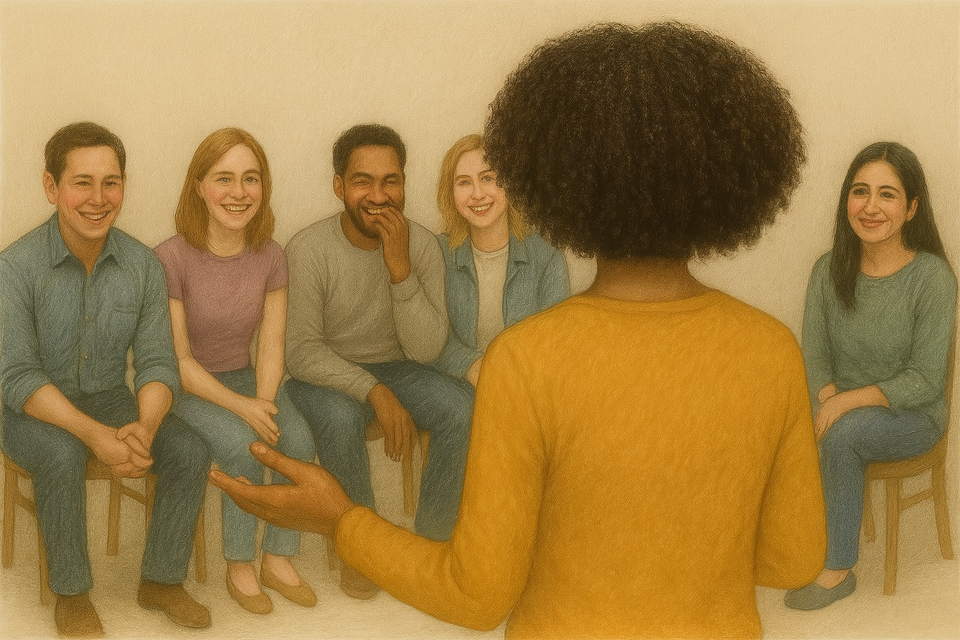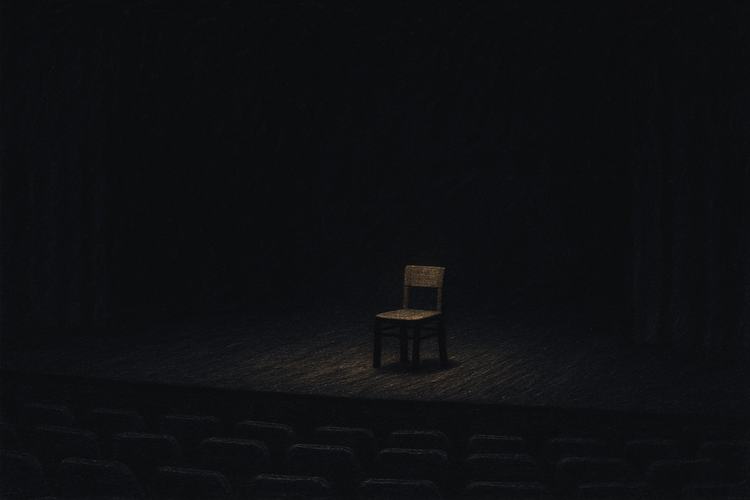At Least Be Famous If You're Gonna Sacrifice Your Family

- This short story is the second from the series Songs in the Key of (D)usty
8 Years Ago
The folding chairs in the community center’s back room always creaked, like they were whispering secrets from too much silence. Tonight, they were arranged in the familiar circle. Eight chairs. Eight bodies. Eight adult children of men who never learned how to father.
Talia sat with her journal in her lap, thumb nervously stroking the spine. She’d waited for the right moment. Or maybe she’d waited for the moment to feel right. Either way, she couldn’t pretend anymore. The nods, the chuckles, the vague emotional tap-dancing that had defined most of their meetings—it wasn’t enough.
She looked around at the group. Jordan, the charming lawyer who drank alone like it was a lifestyle brand. Cassie, the overachieving project manager who hadn’t cried since the Obama inauguration. Micah, the comic relief who used weed and sarcasm interchangeably. Rina, the activist held together by caffeine and obligation. Devon, who did his grieving through fitness challenges and ghosting women. Zoya, the polished grad student whose tote bag probably had a flask in it. Malik, quiet, but when he spoke, everyone shut up and listened.
And then her. Talia. Early thirties. Always poised. Always prepared. Always one step removed from actually cracking.
She took a breath. “I wrote something,” she said. “It’s not soft. But it’s honest.”
And then she read:
“I hate my dad.
I hate what he did to my family.
I hate how he treated my mother like her loyalty was owed, not earned.
I hate how he treated my siblings like they were background noise.
I hate how he treated me—like I was both the favorite and the fallout.
I hate that he doesn’t care.
I hate that he blows up lives and calls it a personality.
I hate that he projected his mess onto us and then blamed us for the mess.
I hate that I was his emotional, psychological, and sometimes physical punching bag.
I hate how close he kept me—not to love me, but to use me.
I hate that it made me feel ashamed.
I hate that I’m the one holding the cleanup.
I hate that he doesn’t love me.
I hate that he doesn’t see me.
I hate that he doesn’t love himself enough to get help.
I hate—”
She paused.
“Actually? No. You know what? Scratch that.
Forget the nuance. Forget the grace.
My father sacrificed his family for a shot at glory…
…and all he became was a mediocre music teacher in Corpus Christi.”
The group froze for a beat.
“If he’d become the next Will Smith, I could understand.
Hell, my soul is worth at least that much.”
The laughter started low—Jordan snorted, Micah wheezed, Zoya straight up clapped—and then it snowballed.
Cassie slid off her chair, laughing into her hands like a kid in church. Devon leaned back and wiped his eyes. Rina was breathless, nodding, muttering, “Oh my God, yes,” like it was gospel. Even Malik grinned, wide and open-mouthed.
Talia let the laughter swell before she leaned in again, softer now. Sadder.
“And I’ve spent years carrying the shame like I caused it.
But nah.
The shame lies with him.
Not me.
Not my siblings.
Not my mom.
Him. And him alone.
He had everything he needed to be a good man.
He chose not to.
And I’m done carrying the bill for someone else’s bad decisions.”
Micah wiped his face, voice still shaky from laughing. “I’m so mad at my dad right now but also like… I feel great?”
Cassie nodded. “I want to make a t-shirt. With your quote. But like glitter font. Big fish, small pond, trash dad.”
Jordan lifted an imaginary glass. “To Talia’s dad. May his students learn music and nothing else.”
More giggles.
Devon sighed, finally speaking. “I thought we were supposed to be crying in here.”
Malik, deadpan: “We are. But funnier.”
One by one, stories spilled out—not polished or packaged, but raw and ridiculous and real. Like kids who finally got permission to talk back to the grown-ups who let them down.
The air didn’t feel heavy anymore. It felt light. Like maybe the truth really could set you free.
Later, after the group drifted out in twos and threes, still laughing, still high off honesty, Talia stayed seated. Her journal was closed, her hands relaxed.
She didn’t feel healed. She didn’t feel heroic.
But she felt right.
And more than that, she felt done.
She looked down at her shoes, then up at the door, and whispered to herself:
“He’s not the headline anymore.
I am.”
And then she smiled—small, sure, and finally hers.

Member discussion